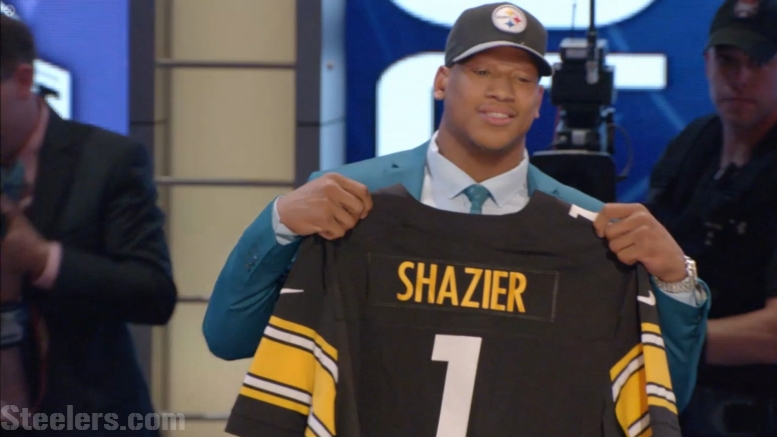During the 2014 NFL Draft, the Pittsburgh Steelers selected linebacker Ryan Shazier in the first-round and defensive end Stephon Tuitt in the second. On the surface, Shazier being selected in the first round should be considered a blessing, however, Tuitt will probably wind up being the more blessed of the two players from a financial standpoint by the start of the 2017 regular season.
Because Shazier was drafted in the first round, the Steelers then had the right to pick up a fifth-year option on his rookie contract this offseason, something they eventually and unsurprisingly did several weeks ago. In doing so, Shazier will now likely have to wait until this same time next year to sign a lucrative contract extension. Tuitt, on the other hand, will more than likely sign a very lucrative contract extension prior to the start of the 2017 regular season and thus you can see why Shazier is a little miffed with the way the current CBA is set up.
In case you missed it, Shazier recently voiced his displeasure with the way the current CBA is set up and specifically how it now allows players selected after the first round the ability to cash in a year earlier than he can.
During a Monday in interview on SiriusXM NFL Radio, Shazier was asked to further explain his stance on the topic.
“I was just saying that I feel if guys do a great job of playing, they should be able to talk with their team and get paid,” Shazier started. “I was just saying that we’ve got to do a better job at the Collective Bargaining Agreement because I notice that guys that come in the same draft year may have to wait sometimes just because the round that they got drafted in. It’s a plus and a minus, but I feel at the end of the day, if you perform at a level and you and your team have a talk about it, you should be able to get paid.”
Following Shazier’s comments, the linebacker was then asked if he thinks veterans would be willing to compromise some of their own long-term prosperity for the younger players coming into the league when it comes to future CBA negotiations and moving forward if he’d be willing to campaign on the younger players’ behalf as well.
“I think we’ve got to do a better job as a whole,” Shazier said. “The veterans ought to be taken care of because they had to deal with the things that I’m dealing with now, but at the end of the day, we’re all in this as a whole, we all are one and if we want to make sure that we’re taken care of in the long haul, we should take care of everybody, not just ourselves.”
Basically, Shazier wants it both ways in terms of the younger players and veterans all being fully taken care of. That’s fine in a perfect world, but as we all know, when it comes to the NFL and NFLPA CBA negotiations, there’s always some give and take with the former usually responsible for doing most of the taking.
Is it fair that players such as Tuitt can hit gigantic paydays a year prior to those drafted in the first-round? Probably not, but it is worth noting that Tuitt’s first three years in the league earned him $3,560,884 while Shazier earned $7,790,766 during the same span of time, thanks in part to the rookie wage scale. Additionally, Shazier’s four-year, 9,507,204 rookie contract was fully guaranteed while Tuitt’s four-year, 4,609,444 rookie contract only included $2,721,844 in guarantees.
In short, if Shazier doesn’t like his current situation he can essentially thank the veterans who were in the league in 2011 for not fighting hard enough for the younger players and future rookies. With that said, the Steelers were the only team in the NFL that voted against ratifying the current CBA in 2011.
The current CBA runs through the 2020 season and can obviously be extended at any time. However, with that noted, NFLPA executive director DeMaurice Smith made it clear this past January that the NFL can forget about any sort of an extension of the CBA happening without some changes in it first taking place.
So, what kind of changes need to be made in future CBA negotiations that will favor the NFLPA? Well, if you like reading about such things, Andrew Brandt, a former sports agent and NFL team executive, wrote a two-part series on that very topic last September, the halfway point of the current CBA. Here’s Part 1 and Part 2.
Currently, Steelers guard Ramon Foster is the team’s NFLPA representative while center Maurkice Pouncey and defensive end Cameron Heyward are serving as co-alternates. With Shazier being so vocal this offseason, it will be interesting to see if he winds up being the team’s NFLPA representative down the road.
Foster, by the way, urged his fellow NFL players nearly one full year ago that they should start saving their money now in preparation for another lockout after the current CBA expires.








